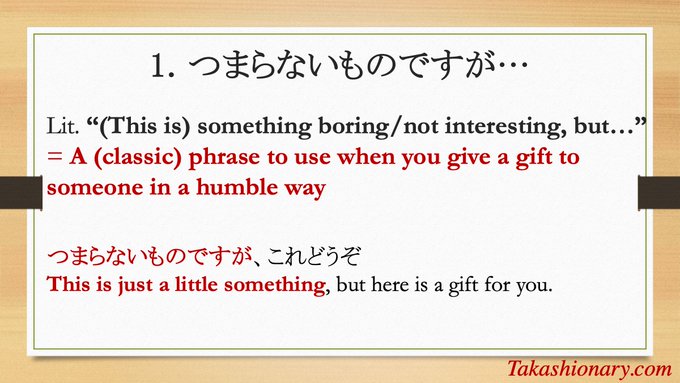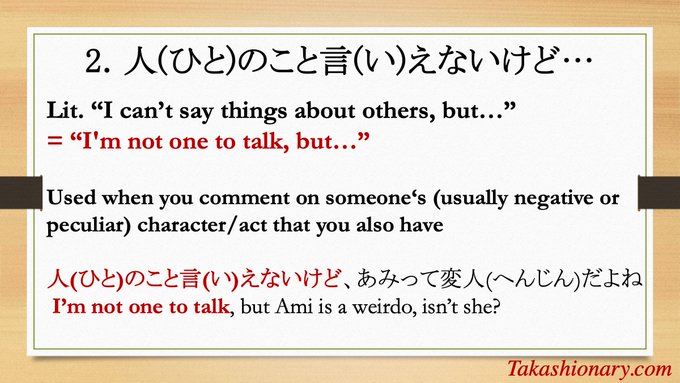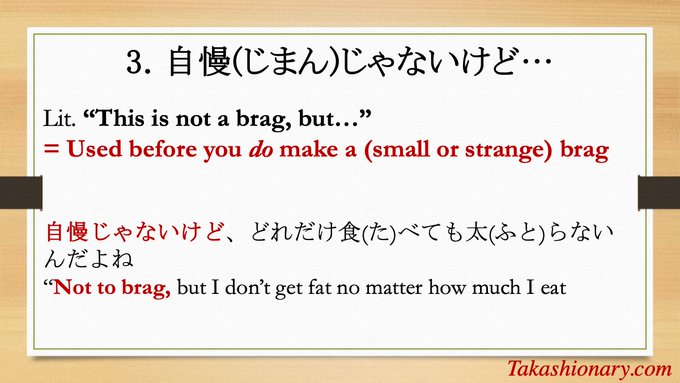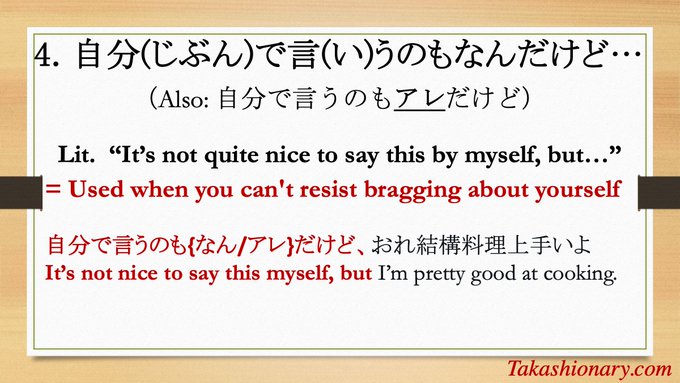
Takashionary
@takashionary
Followers
10,205
Following
81
Media
200
Statuses
3,658
Takashionary introduces unique Japanese slang & idioms (Posted by Takashi, a native Japanese speaker and PhD in Natural Language Processing) 面白い日本語を英語で紹介しています!
🇯🇵
Joined September 2018
Don't wanna be here?
Send us removal request.
Explore trending content on Musk Viewer
#CDTVライブライブ
• 167527 Tweets
立憲民主党
• 75571 Tweets
Şeyda Yılmaz
• 75429 Tweets
KALAKAL LIVE ON ROADSHOW
• 73629 Tweets
領空侵犯
• 46939 Tweets
紫耀くん
• 37754 Tweets
#INZM_HyperBandLive
• 35792 Tweets
ロシア機
• 32887 Tweets
Yunus Emre Geçti
• 32531 Tweets
野田さん
• 27803 Tweets
#アイスランキング
• 24672 Tweets
Rachel Reeves
• 23445 Tweets
政権交代
• 22261 Tweets
ホークス
• 16991 Tweets
フレア使用
• 14612 Tweets
林官房長官
• 14361 Tweets
TEN FIREWORK IT
• 13368 Tweets
航空自衛隊機
• 10450 Tweets
初のフレア
• 10016 Tweets
Last Seen Profiles
よっ友(とも) [Slang]
= a “friend” of yours whom you occasionally bump into at a certain place (e.g. at school/work) and say よ (Hi), but don’t actually start a conversation with because you are not that close to each other and you know its gonna be awkward.
#nihongo
11
149
1K
Since Twitter is in the limelight, I'm sharing some Japanese Twitter slang words, for what it's worth (🧵)
1. エアリプ (ea ripu)
Short for the Japlish term エアーリプライ (“air reply”) and means “to implicitly reply to someone’s tweet without mentioning them”
#langtwt
#日本語
6
257
941
If you're in Japan and feeling a bit tired, you're not alone.
What 五月病 ("May Disease") means in Japanese.
#nihongo
#studyJapanes
6
187
668
In Japanese, #相合傘 (aiai gasa) means ‘to share one umbrella among two persons (esp. a couple)’. This is something that most Japanese people yearn for in their childhood, and kids often draw 相合傘 on a notebook to make a wish to be together with their crush.
#日本語
#nihongo
3
134
643
A wonderful list of Japanese onomatopoeias (with ample examples of how to use them in context), compiled by 国語研 (こくごけん: The National Institute for Japanese Language and Linguistics)
#nihongo
#日本語
1
197
536
つ is used as "Here you go" on the web as it looks like a hand that gives something to someone; e.g. (´・ω・)つ🍵
And here it coincidentally looks like handing a smile to you
#nihongo
#learnJapanese
3
87
514
@englishfess_
For those who wonder what is this, here is (almost) everything you need to know about "The moon is beautiful, isn't it?" in Japanese.
More are details in my blog post, explaining why "i can die happy" or the like is totally irrelevant to this expression.
1
108
491
Don't always translate 普通(ふつう)に as "normally", as it can mean "honestly/really/seriously/for real" in casual contexts.
E.g. if someone says 普通に興味ある, that means "I'm actually very interested (not just saying)" and 普通に嬉しい is "I'm honestly so happy".
#nihongo
6
79
494
Japanese netizens call this viral Turkish silver-medal winning shooter “無課金(むかきん)おじさん”, meaning “a freemium-user old bloke” because his clothes/equipments are as simple as typical default avatar’s clothes
3
68
449
Six Variants of よろしく
- 宜しく (kanji)
- 夜露死苦 (improper kanji; outdated, used to be popular among loutish youths, ヤンキー)
- 4649 (numbers)
- ヨロピク (playful, outdated)
- しくよろ (back slang; playful and outdated)
- よろ (shortened; casual)
#JLPT
#には役に立たない
9
76
428
勉強代 (べんきょうだい, "study cost")
= a word used when you wasted your money on something (e.g. buy expensive stuff that you never use), but you (try to) think that you learnt a life lesson from that mistake and you paid the money for it
#日本語
#nihongo
2
68
399
A translation error caused by the classic tokenisation mistake in
#nihongo
— misinterpreting 外国人参政権 as 外国 (“foreign”) + 人参 (🥕) + 政権 (“government/regime”), instead of 外国人 (“foreigner”) + 参政権 (“suffrage”)
* Usually fixed in modern-day translation systems
5
96
392
How to Use 全然 (zenzen) in Japanese; there is so much more than you learn in a textbook!
#nihongo
#learnjapanese
6
69
366
Both 回答 and 解答 read "かいとう" and can be translated as "answer" in English. But the main difference is:
- 解答: to answer a question that has a correct (prepared) answer (e.g. quiz, exam)
- 回答: to *reply* to a question that doesn't (e.g. questionnaire, enquiry).
#Nihongo
3
61
355
Now you can tell why I'm more active on Twitter than Instagram...
絵を描くスキルが喉から手が出るほど欲しい🙃
#nihongo
#learnJapanese
5
58
354
@ScriptingJapan
Actually when I teach this expression, I usually say “If you say this to Japanese people, they will probably laugh”😂.
Probably because it’s so classic a phrase that they don’t expect non-Japanese ppl to use it (I mean, even young Japanese ppl don’t use it nowadays)
3
7
337
Meaning of やけくそ (yakekuso), i.e. あーもうどうなってもいいや state of mind
If you eat something or drink alcohol a lot in a yakekuso way, that’s やけ食(ぐ)い and やけ酒(ざけ), resp.
#nihongo
#日本語
2
59
314
するする詐欺(さぎ)
Lit. "do do fraud"
= repeatedly saying you will do something but never take action; be all talk and no action
日本語勉強するする詐欺をやめたい
I wanna stop just saying "I'm gonna study
#Japanese
" without taking action.
Other verbs can be also used; see below
5
52
313
Now a Japanese NHK drama series titled #舟を編む is on the air, which is about lexicographers compiling a new dictionary!
It's based on a novel with the same title, which won 本屋大賞 (Japan Booksellers' Award) in 2012. Previously, the book was also made into a film and anime
5
64
304
なるはや = "ASAP"
It's short for なるべく早(はや)く, "as soon as possible"
Usually used as "なるはやで" when you ask someone to do something ASAP
なるはやで (= なるべく早く) 終わらせてね
Please finish it ASAP
#nihongo
#日本語
4
39
295
I've updated my Japanese glossary list a bit; now it contains 200+ intriguing
#nihongo
words/phrases with their definitions and example sentences.
1
57
274
When someone says “俺/私をなめるな”, it means “Don’t underestimate/mock/take the piss out of me”, not “Don’t lick me” (unless said in a situation where it makes sense)
This sense is said to originate from なめし in the old
#nihongo
, meaning “rude”, according to this quoted post
2
44
256
(E.g.)
友達に見送られ、後ろ髪を引かれる思いで出国した
Some of my friends came to see me off, and I left the country with a bit of lingering attachment to it.
#nihongo
#日本語
2
37
229
In the following phrases, 赤(あか, "red") means "complete/total".
赤の他人(あかのたにん):
"a complete stranger; someone whom you have zero relationship with"
真っ赤な嘘 (まっかなうそ):
"a complete lie"
This is said to originate from the bright colour of red
#Nihongo
#日本語
0
28
228
If you're a cat person who is learning Japanese, you may like these Japanese 猫 (neko) idioms😸
#langtwt
#learnjapanese
3
72
219
クリぼっち
Japanese slang word meaning “to spend Christmas alone”; short for クリスマスぼっち
cf.
ぼっち飯(めし): “to eat alone”
ぼっち: “be alone/without company”
#nihongo
6
23
223
十八番 (じゅうはちばん or おはこ)
Literally “number 18”
Meanings
1. “your song” — a song that you like and sing well (at karaoke)
2. your forte
E.g.
私の十八番はYOASOBIのアイドル!
The song that {I like to sing/I am good at singing} is “Idol” by YOASOBI!
#nihongo
4
35
220
見(み)るからに
“apparently; obviously; can tell at a glance”
Often used with “…そう” (look …)
この映画(えいが)、見るからにつまらなそうだ
I can tell at a glance that this movie is boring
見るからに辛(から)そうなラーメン
Ramen that is apparently spicy
#日本語勉強
#nihongo
1
27
198
[Slang] かわいいが渋滞している
= "be filled with kawaii; cuteness overload; too/so cute"
(渋滞(じゅうたい) = "traffic jam")
この動画、かわいいが渋滞している!
This video is cuteness overload!!!
#nihongo
#日本語
2
24
191
借(か)りてきた猫(ねこ), "a borrowed cat"
= a Japanese idiom used when someone is very quiet in an unfamiliar environment and behaves very differently than usual
#nihongo
#learnjapanese
4
34
189
There's a unique project in Japan that aims to make a new idol group called "PhD48", where every member holds a PhD
Potential criticism aside, this may bring more recognition to the word "PhD" and 博士号(doctorate), whose concepts are not well known/understood among Japanese ppl
4
38
183
パンの耳 (みみ)
Literally "ears of bread"
= "bread crust; the outer skin of shokupan (milk/plain bread)"
#nihongo
#にほんご
3
32
185
The meaning can be either positive ("be not easily upset; immune to pressure/criticism") or negative ("shameless; impudent")
Near Antonyms:
- 繊細 (せんさい): sensitive
- 豆腐(とうふ)メンタル; nerves of tofu = "mentally weak" (Slang)
#Nihongo
#日本語
3
33
183
遠慮の塊 (enryo no katamari)
Kansai dialect slang word meaning “a last piece of food on a plate shared by multiple people”
= The last bit of food on a plate that nobody reaches for because of 遠慮 ("to hold back doing things out of consideration for others")
#kansaiben
#nihongo
2
39
175
In Japanese, passive voice can be used with intransitive verbs at times to indicate the annoyance of the event/behaviour.
E.g.
雨に降られた (降る: fall)
= It rained; (I) got caught in a shower
子供に泣かれた (泣く: cry)
= The child cried (and I felt it a bit troublesome)
#Nihongo
3
22
174
推(お)し
= "a person/character whom you stan/support as an avid fan"; it comes from the verb 推す, "to stan"
It used to be a jargon term among idol fans, but now it's often used among young people to describe an idol member or anime character they stan, as in 私の推し
#japanese
5
30
171
言(い)わんこっちゃない
= "I knew this was coming; I told you so"
Used when something bad happens after you warned someone that it would happen or you well anticipated it would happen.
Often used with ほら/ほーら/ほらね (See?), like ほら、言わんこっちゃない
#nihongo
3
21
165
不幸中の幸い (ふこうちゅう の さいわい)
= a phrase that describes when you have bad luck (不幸), but at the same time you feel lucky in a way because it could have been worse
(e.g.) getting hit by a car in front of a hospital
#日本語
#learnjapanese
9
29
168
#kanji
/official yomi/unofficial yomi
店員/てんいん/ていいん
全員/ぜんいん/ぜいいん
体育/たいいく/たいく
雰囲気/ふんいき/ふいんき
Unofficial ones are often used in a convo (as it’s easier to pronounce). ふいんき is so common that you can type it to write 雰囲気 in some keyboards
9
32
165
うろ覚(おぼ)え
"to remember something only vaguely"
Often used as うろ覚え{だけど/ですけど} when you share some knowledge/information with someone but you're not quite certain whether they are accurate or not.
#日本語
#nihongo
1
23
161
食っちゃ寝(くっちゃね)
= to do nothing but eating and sleeping; a sound change from 食っては寝
夏休みの間、食っちゃね生活をしてたら5キロ太った
During the summer break, I've been doing nothing but eating and sleeping and gained 5kg
#日本語
#Nihongo
2
17
163
Ohh this is similar to 黒歴史 (くろれきし, lit. "black/dark history"), which means "your embarrassing secret/past (that you want to forget and hide from others)".
昔、彼と付き合っていたのは私の黒歴史だ
The skeleton in my closet is that I used to be dating him.
#nihongo
#日本語
"Skeleton in the closet" is an embarrassing or shameful secret about something that happened in the past.
⠀
Example: My father was in jail for a day once. That's our family's skeleton in the closet.
⠀
Learn idioms in our app -
⠀
#idioms
#englishidioms
1
15
80
1
29
159
記念受験 (きねんじゅけん)
Lit. "to take a memento exam"
= "to take an entrance/qualification exam knowing you're gonna fail"
For instance, it is going to be 記念受験 if you take the JLPT N1 test armed with in-depth knowledge about Japanese anime characters.
#nihongo
#日本語
1
15
155
馴れ初め (なれそめ)
= "how a couple started dating; an event or opportunity that ignited a romantic relationship between two persons"
Usually used to ask a (nosy) question of a married couple, like 二人の馴れ初めは? ("How did you two meet/start dating?")
#nihongo
#日本語
2
22
158
I've made a tool (mostly based on other people's work) that automatically generates furigana/romaji for Japanese words, splits sentences into words, and provides grammar info for each word. I hope to add more high-tech functions soon.
#Nihongo
#日本語
6
23
150
これはこれで ...
= a phrase used when something is not typical/what you expected/what was planned, but you find it rather good
このチョコ思ったより苦かったけど、これはこれで美味しい
This chocolate tastes bitter than I thought, but still it's tasty
#nihongo
#studyJapanese
1
22
153
I've been building a glossary of Japanese phrases (idioms/slang) with their definitions/example sents:
It consists of 160 entries atm, and I think the number will be > 500 if I include all words that I've ever explained!
#nihongo
#日本語
3
42
147
"because …" in Japanese dialects:
…(だ)から (Standard)
…(や)から (Kansai)
…(や)さかい (Kansai, almost outdated)
…(じゃ)けん/(や)けん (Hiroshima, Fukuoka, etc)
明日暇だから/やから/やさかい/じゃけん、飲もう
Coz I am free tomorrow, let's go for a drink
#nihongo
#日本語勉強
3
22
144





























































































